Taking a page out of Eric Swalwell's playbook, it's been revealed that a prominent anti-Trump Washington Post columnist is married to a secret spy for South Korea who previously worked for the White House.
The wife of Moscow-born writer Max Boot, who has falsely accused former President Donald Trump of being a Russian asset, was arrested this week for allegedly acting as an unregistered agent of the South Korean government.
It's even funnier when you realize Boot is a columnist specializing in "national security" specifically. pic.twitter.com/pfwYsHR8BV
— T. Becket Adams (@BecketAdams) July 17, 2024
Boot's spouse, Sue Mi Terry, is charged in a federal indictment with secretly spying for the Republic of Korea (ROK), commonly known as South Korea, by selling U.S. intelligence information, enabling access to high-ranking U.S. officials, and disseminating pro-ROK propaganda disguised as advocacy in exchange for luxury gifts, like designer handbags, and expensive dinners, among other bribes she's accused of accepting.
Terry, a former White House official and ex-Central Intelligence Agency (CIA) employee, was on the National Security Council (NSC) under Presidents Barack Obama and George W. Bush as the director of Korean, Japan, and Oceanic Affairs. Prior to that, she served as a senior CIA analyst on East Asian issues from 2001 to 2008. In that role, she produced hundreds of intelligence assessments, including a record number of contributions to the president's daily brief.
According to the 31-page indictment charging Terry with one count of conspiracy to violate the Foreign Agents Registration Act (FARA) and one count of failing to register under FARA, she advocated for South Korean policy positions, shared non-public U.S. government information with South Korean intelligence officers, and allowed South Korean government officials to access their U.S. counterparts.
In return for her years-long services to the South Korean government, Terry was allegedly rewarded with Bottega Veneta ($2,950) and Louis Vuitton ($3,450) purses; a $2,845 Dolce & Gabbana coat, which she returned for a $4,100 Dior dud instead because the other designer brand wasn't to her liking; and over $37,000 in "covert" funding for a public policy program on Korean affairs that she operated. According to the indictment, as a means of masking the true source of the money, the cash was concealed by being deposited into an unrestricted "gift" account Terry controlled at the think tank where she was employed at the time. The checks were "nominally issued" by the South Korean Embassy.
Recommended
The charging documents contain surveillance camera still-shots of Terry's shopping spree with her handler at her side. The purchases, charged to her handler's credit card, didn't incur a sales tax due to his diplomatic status.

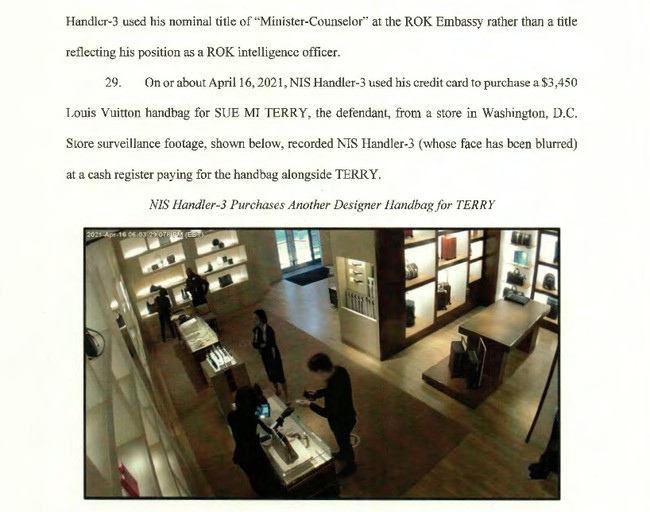
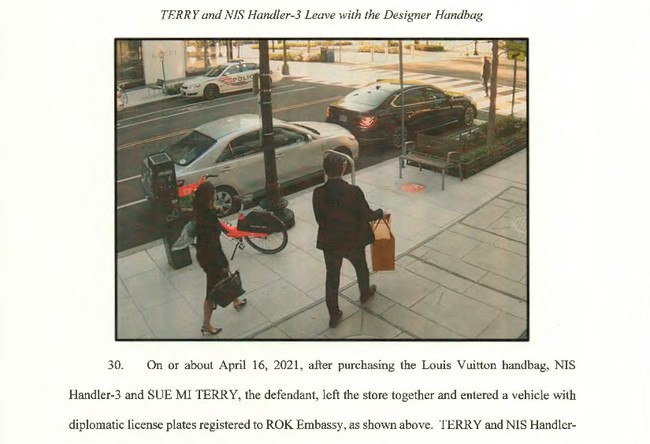
Boot, a notorious Never Trumper writing weekly for The Washington Post as a columnist covering national security, laid out "18 reasons Trump could be a Russian asset" in a 2019 listicle, which he widely promoted.
As I write in @PostOpinions, if Trump isn’t a Russian agent, he’s doing a pretty good imitation of one: https://t.co/jNI2krCF4Z https://t.co/EBIUsLpfUD
— Max Boot 🇺🇦🇺🇸 (@MaxBoot) January 14, 2019
Boot and Terry, both fellows at the Council on Foreign Relations, have co-authored countless Washington Post articles together commenting on U.S. foreign policy. In particular, last year, they wrote a joint op-ed for The Washington Post, where they praised the foreign policy "achievements" of President Joe Biden, who they said "deserves considerable credit" and "has a much surer sense of what is realistically achievable than did his predecessor," former President Donald Trump.
One of these Washington Post opinion pieces she co-bylined, titled "South Korea Takes a Brave Step Toward Reconciliation with Japan," was cited in the indictment as an article Terry published at the urging of South Korean intelligence officers (via the indictment):
In March 2023, Terry received a call from a Korean Foreign Ministry official. Afterward, Terry texted that there were "already many articles written on this topic," pointing to pieces pertaining to geopolitical relations between South Korea and Japan. In a follow-up message, Terry wrote, "So for me to write an oped, I need the following information," and listed a series of questions about ROK-Japan relations, which the ROK officer answered in detail. Later that day, The Washington Post ran Terry's report, which was "broadly consistent" with the crafted responses sent to Terry. Upon publication, Terry texted, "Hope you liked the article," and linked to it. The intelligence officer said senior ROK officials had "read and appreciated" Terry's work: "Thank you so much for your zeal and endeavors! Of course we do. Actually, Ambassador and National Security Advisor were so happy for your column."
Wowwwww. Indictment claims Sue Mi Terry slipped Republic of Korea propaganda into US op-eds at request of ROK gov officials. She was fed talking points directly, which then ended up (“broadly consistent) in Boot’s column.
— T. Becket Adams (@BecketAdams) July 18, 2024
“Hope you liked the article!” she texted her handler. pic.twitter.com/G44V52jSyO
Though The Post's editorial team never disclosed the pair's marital status in their bylines or editor's notes, in a write-up on Terry's arrest Tuesday, the newspaper acknowledged that they "did not disclose Korean government involvement" in the article now flagged by federal authorities.
"The Washington Post is committed to publishing independent journalism and is reviewing the indictment. We do not have further comment," said Kathy Baird, a Post spokeswoman.
I am genuinely interested in hearing the justification for declining to disclose that the authors are literal bedfellows. Seems like something the reader deserves to know upfront.
— T. Becket Adams (@BecketAdams) July 17, 2024
South Korean officials allegedly commissioned Terry on multiple occasions to write to U.S. and Korean media conveying ROK-provided positions and phrases, including $500 for writing positive press in a South Korean newspaper praising a summit between Biden and South Korea's President Yoon Suk Yeol. "Ideally, what would you like me to write on? (I mean angle of the Op Ed)," Terry is alleged to have texted. She was instructed to write "that the summit means a lot for the alliance and good for Korea and the alliance," the indictment says. She apparently acquiesced, writing that she sees "A More Solid Road Ahead for 70 Years of Alliance" following the Biden-Yoon summit that she said "Strengthens US-ROK Alliance."
They also wined and dined her at Michelin-starred restaurants, federal authorities allege, as well as upscale sushi spots.
During these fancy dinners with her handler, Terry was allegedly fed talking points that she would subsequently parrot in media appearances on U.S. airwaves.
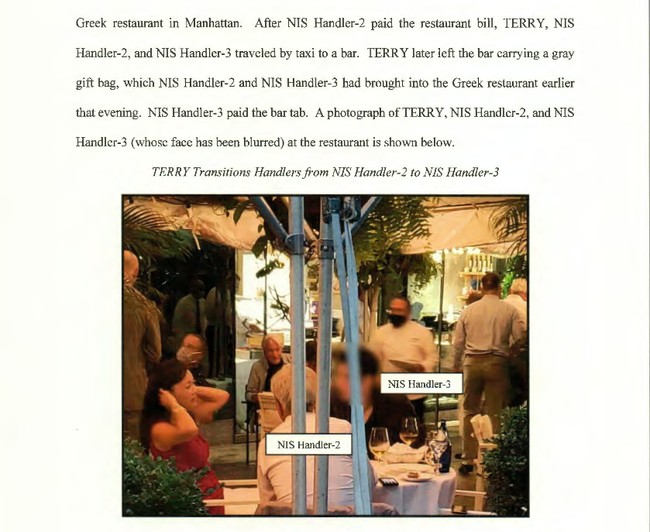
In the past, Boot has also appeared alongside Terry on CNN, where they were touted as an on-air dynamic duo, to talk about North Korea.

Boot has joked about betting that Terry will become the "first female dictator in hundreds of years after she ascends to power in North Korea."
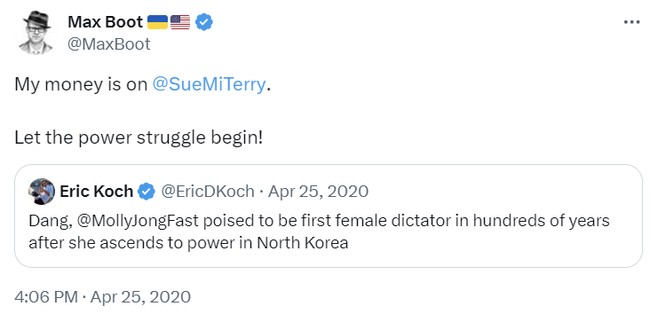
Terry, a senior Council on Foreign Relations fellow for Korean studies, has since been placed on unpaid administrative leave, according to her now-scrubbed biographical page on the invitation-only think tank's website. A spokesperson for the Council on Foreign Relations told The Post that the alleged activities predate Terry's tenure at the think tank. Boot, who has not been criminally charged in the spying scheme, remains a senior fellow there specializing in national security studies.
Terry is facing criminal charges in federal court in Manhattan. If convicted on all counts, she faces a maximum penalty of 10 years in prison, a U.S. Department of Justice (DOJ) press release announced. According to court records reviewed by Townhall, Terry was released after posting a $500,000 bond, which was co-signed by Boot. As part of her conditions of release, Terry's travel is restricted to the continental U.S.
Terry's secret spy gig allegedly stretches back a decade to 2013, a few years after she exited the U.S. federal government.
Terry confessed in a Federal Bureau of Investigation (FBI) interrogation that she was a "source" for South Korea's National Intelligence Service (ROK NIS) and handed over "valuable" information. Terri also admitted that she had resigned from the CIA "in lieu of termination" because the agency had "problems" with Terry's ROK NIS contacts.
The FBI had suspicions about Terry's activity as early as 2014. As she was questioned in an interview she gave voluntarily, Terry became "visibly nervous, changed her speech pattern and began to stutter and shift in her seat," the indictment says. Terry was warned that because of her position within the policy community, the ROK might try to approach her by offering to covertly pay for conferences related to Korean policy. Terry responded that she was "glad to have contact with the FBI should such a situation arise." They then tracked Terry over the ensuing years.
Terry's lawyer Lee Wolosky said in a statement shared with Reuters: "These allegations are unfounded and distort the work of a scholar and news analyst known for her independence and years of service to the United States."
"In fact, she was a harsh critic of the South Korean government during times this indictment alleges that she was acting on its behalf. Once the facts are made clear it will be evident the government made a significant mistake," Wolosky added.
U.S. Attorney Damian Williams for the Southern District of New York said in a press statement that Terry had "sold out her positions and influence" for personal gain and "subverted foreign agent registration laws."
In June 2022, Terry participated in a private, off-the-record meeting attended by U.S. Secretary of State Antony Blinken and his senior staff regarding national policy towards North Korea, the DOJ says. The purpose of this meeting was to provide Blinken with an opportunity to engage with North Korean policy experts, one of whom was Terry, in a discreet setting. Immediately after the event ended, Terry allegedly met her primary ROK point of contact and passed him detailed handwritten notes disclosing what happened in that hour-long, closed-door briefing at the U.S. State Department building. Terry's handler picked her up in a vehicle with diplomatic plates registered to the South Korean Embassy. Inside, her handler photographed two pages of Terry's note-taking, written on her think tank's letterhead, as depicted by redacted copies of the pictures taken in the interior of the car.
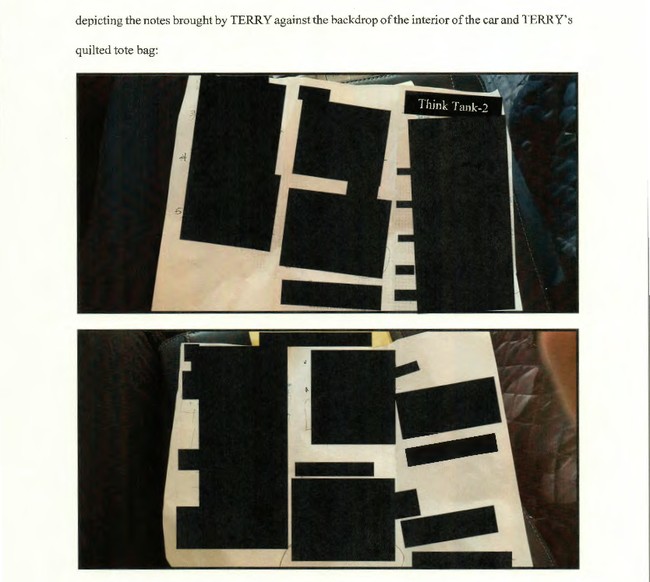
In July 2022, at her handler's request, Terry hosted a happy hour in Washington, which was funded by the South Korean intelligence agency, and invited staff from various congressional offices to it under the auspices of the policy institute where she worked, prosecutors allege. Posing as a diplomat and mingling with the congressional staff members, Terry's handler, a ROK intelligence officer unbeknownst to the attendees, also attended the social gathering, the indictment continues, saying she arranged this event so she could enable South Korean officials to "identify, evaluate, and potentially recruit" congressional staffers, "whom they otherwise would not have been able to access." The tactic is known in intelligence operations as the practice of "spot and assess." Terry, allegedly aware of the tactic, told the FBI that this was like "bringing the wolf in." The attendees received gift bags containing Yeti-brand tumblers and pamphlets with the logo of the South Korean Embassy. At the happy hour's conclusion, one of the ROK intelligence officers "paid the bill," according to the federal prosecution.
Terry has testified at least three times before congressional panels. Each time, Terry was required to sign a "Truth in Testimony" disclosure form declaring that she was not an active registered foreign agent. In 2016, she delivered testimony in front of the U.S. House Committee on Foreign Affairs Subcommittee on Asia and the Pacific for a hearing on "North Korea's Perpetual Provocations: Another Dangerous, Escalatory Nuclear Test." In connection with her congressional testimony, on the federal form, Terry answered "No" to the question, "Are you an active registrant under the Foreign Agents Registration Act (FARA)?" She said the same in 2017 ahead of her testimony before a U.S. House Committee on Foreign Affairs hearing discussing "Countering the North Korean Threat: New Steps in U.S. Policy." Ahead of another 2022 appearance before Congress, where she was a witness offering remarks on "The Way Forward on U.S. North Korea Policy: Dealing with the Regime's Growing Nuclear Threat" to the U.S. House Subcommittee on Asia, the Pacific, Central Asia, and Nonproliferation, she signed the paperwork saying she's not a FARA agent.
A naturalized U.S. citizen, Terry was born in Seoul but raised in Virginia and Hawaii. She currently resides in New York.

















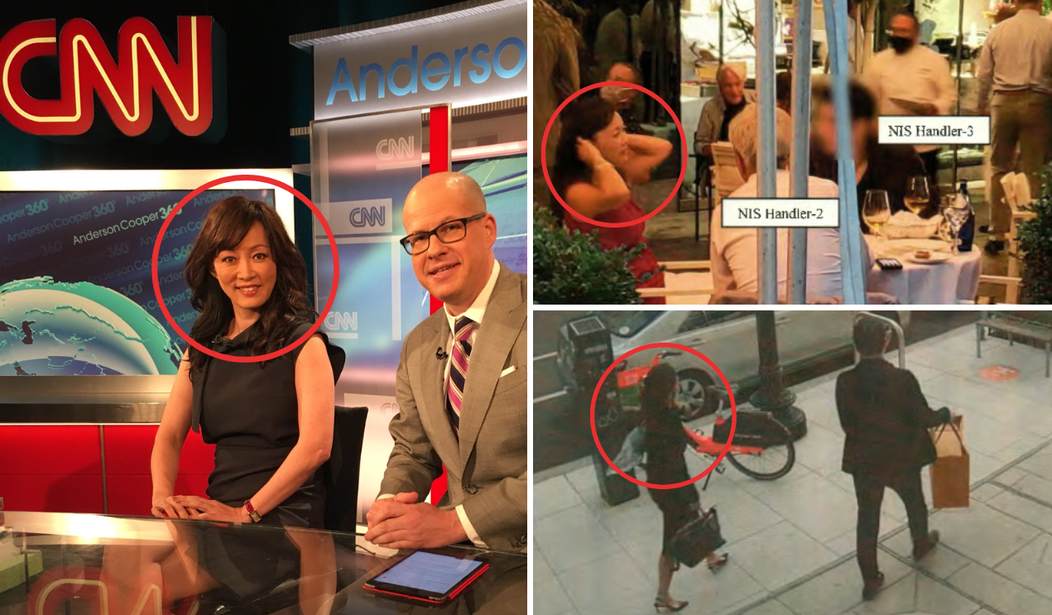







Join the conversation as a VIP Member